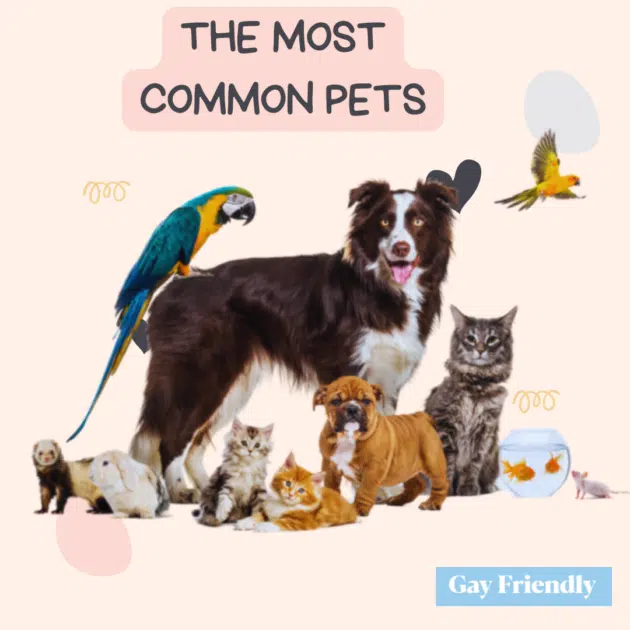A pet is a domestic or tamed animal kept in one’s home for companionship or pleasure. Sometimes referred to as “companion animals”, these are different from what would be considered a working animal (guide dogs, draft horses, herding dogs, barn cats, etc) or livestock.
There can be similar kinds of animals used as pets or working animals. Generally, livestock are not pets but in some cultures and farms, this does occur.

Pets generally have an appealing look, gentile behavior and adapt well into the family of those who keep them. Some people have single pet homes, some have multiple pets – some of the same species, some mixed species.
The Appeal of Pets
Pets have an innate charm that captivates our hearts and makes them cherished companions. They effortlessly become part of our families, bringing joy and happiness. Pets have an attractive appearance, often exhibiting features that evoke adoration.
Whether it’s a dog’s soft fur, a cat’s graceful movements, or the vibrant colors of tropical fish, pets possess a visual appeal that draws us to them.
Beyond their appearance, pets exhibit gentle behavior that endears them to their owners. They provide unconditional love, comfort, and companionship, creating strong emotional bonds.
Pets can understand and connect with their human counterparts, offering solace during difficult times and celebrating happy moments.
Caring for Pets
Caring for pets goes beyond providing them with food, water, and shelter. Responsible pet owners ensure their furry or feathery friends receive comprehensive care and attention. In addition to the essentials, pets are often pampered with toys, treats, and enrichment activities.
These additions contribute to their overall well-being and happiness. Toys provide mental stimulation and physical exercise, while treats serve as rewards for good behavior.
Socialization with other animals and humans helps pets develop positive behaviors and adapt to various environments. Some pets also serve as guardians of their owners’ homes and properties. These pets offer protection and security, serving as a deterrent to potential threats.
However, even if they perform this role, they can still be considered companions, as they reside within the home and provide emotional support to their owners.
Recommended: 5 Essential Pet Safety Tips: Seasonal Do’s and Dont’s for Humans
The Most Common Pets
Pets come in various shapes, sizes, and species. While personal preferences play a significant role in choosing a pet, certain animals have become particularly popular as household companions. Let’s explore some of the most common pets:

Dogs: Man’s Best Friend
Dogs have rightfully earned the title of “man’s best friend.” They are loyal, loving, and highly sociable animals. Dogs come in different breeds, each with its unique characteristics and traits.
There’s a dog for every lifestyle and preference, from energetic and playful breeds like Labradors and Golden Retrievers to calm and affectionate breeds like Bulldogs and Pugs.
Cats: Independent and Affectionate Companions
Cats are known for their independent nature and mysterious charm. They are self-sufficient animals that provide affection on their terms.
Cats are sleek, nimble animals that frequently enchant their owners with their beauty. Cats, whether lively kittens or regal adults, add peace and comfort to any home.
Fish: Serenity in an Aquarium
Keeping fish as pets offers a serene and captivating experience. Aquariums filled with colorful fish create a calming and tranquil atmosphere.
Watching fish gracefully swim through the water can be a source of relaxation and stress relief. Fishkeeping is a hobby that requires attention to water quality, suitable habitat, and appropriate diet to ensure the well-being of these aquatic pets.
Birds: Feathered Friends with Melodious Tunes
Birds are delightful pets known for their colorful plumage and melodic songs. Their chirping and playful antics bring a vibrant energy to any household. Birds require specialized care, including a spacious cage, a balanced diet, and mental stimulation to keep them happy and healthy.
Popular pet bird species include budgerigars, cockatiels, lovebirds, and parrots.
Rabbits: Furry and Playful Companions
Rabbits are cute and cuddly pets that capture our hearts with floppy ears and twitching noses.
These herbivorous mammals require a suitable enclosure, a balanced diet rich in hay and vegetables, and regular exercise. Rabbits are social animals that enjoy gentle interactions and playtime with their owners.
Guinea Pigs: Gentle and Sociable Pets
Guinea pigs are small rodents known for their gentle nature and sociability. They make great companions, particularly for families with children. Guinea pigs thrive on interaction, requiring daily playtime and mental stimulation.
These delightful pets are easy to care for, with their soft fur and expressive faces bringing joy to their owners’ lives.
Hamsters: Small, Furry Balls of Energy
Hamsters are tiny, energetic creatures that provide endless entertainment. They are nocturnal animals, spending their nights running on wheels and exploring their habitats. Hamsters require secure enclosures, a varied diet, and plenty of toys and tunnels to satisfy their curiosity.
With their fluffy appearance and amusing antics, hamsters make delightful pets for individuals seeking companionship.
Gerbils: Curious and Active Little Friends
Gerbils are small rodents known for their curiosity and agility. These social animals thrive in pairs or small groups, enjoying each other’s company.
Gerbils require spacious enclosures with tunnels, hideouts, and exercise wheels. Providing a balanced diet and mental stimulation ensures their well-being and happiness.
Ferrets: Energetic and Mischievous Pets
Ferrets are playful and mischievous pets that offer endless entertainment.
These carnivorous mammals require a dedicated owner willing to provide them with a stimulating environment and regular playtime. Ferrets are known for their boundless energy and curiosity, making them a unique and adventurous addition to the family.
Reptiles & Amphibians: Unique and Captivating Companions
Reptiles and amphibians, like snakes, turtles, lizards, and frogs, offer a distinctive pet ownership experience. These cold-blooded creatures require specialized care, including proper heating, lighting, and habitat setup.
Reptile and amphibian enthusiasts enjoy observing their pets’ fascinating behaviors and unique adaptations.
The Connection Between Pets and Mental Health
Owning a pet has a profound impact on our mental health and well-being. The companionship and unconditional love provided by pets offer numerous therapeutic benefits.
The Therapeutic Benefits of Owning a Pet
Pets serve as constant sources of emotional support and companionship. They can alleviate feelings of loneliness, depression, and anxiety.
Petting an animal releases endorphins, the feel-good hormones that promote relaxation and reduce stress levels.
Pets as Stress Relievers and Mood Boosters
Interacting with pets has been scientifically proven to lower blood pressure and reduce the production of stress-related hormones.
The presence of a pet can create a calming effect, providing a sense of comfort and security. Pets also encourage physical activity and social interaction, fostering a healthier and more fulfilling lifestyle.

The World Society for the Protection of Animals: Advocating for Pets and Their Welfare
For those passionate about animal welfare and making a difference in the lives of pets worldwide, the World Society for the Protection of Animals (WSPA) is an organization worth exploring.
The WSPA works tirelessly to protect animals from cruelty and ensure their well-being.
By supporting their initiatives, individuals can create a better world for pets and raise awareness about their importance in our lives.
The Bottom Line
Pets enrich our lives in countless ways, providing unconditional love, companionship, and joy. From dogs and cats to fish, birds, and exotic creatures, each pet offers a unique bond and experience.
Beyond their roles as companions, pets positively impact our mental health, reducing stress and promoting overall well-being. By embracing the joys of pet ownership and advocating for their welfare, we create a world where pets thrive alongside us.





















